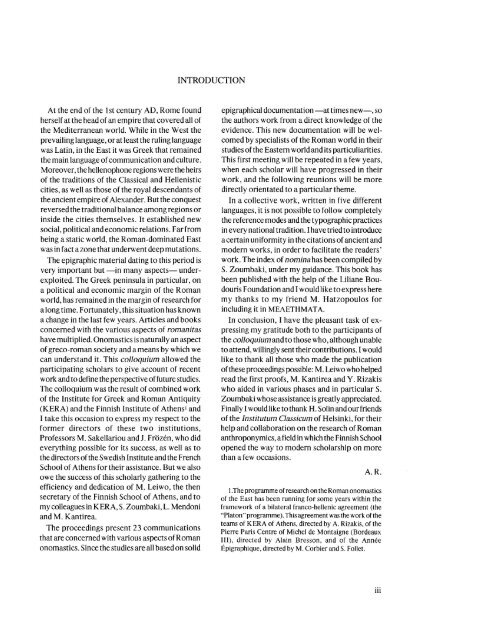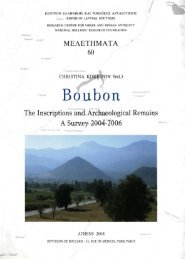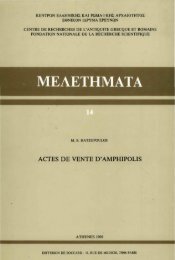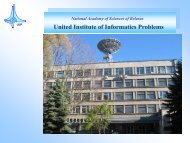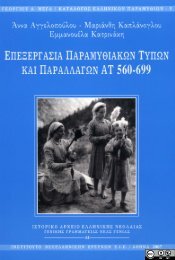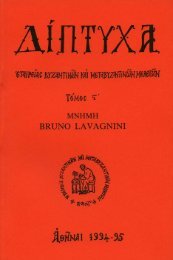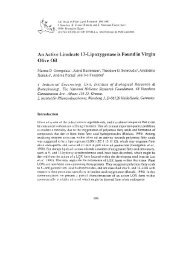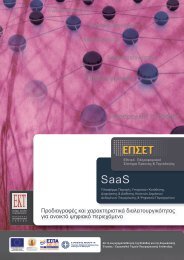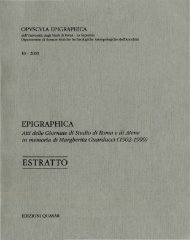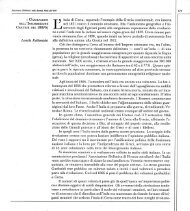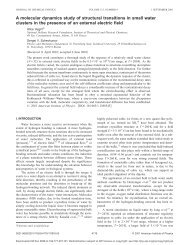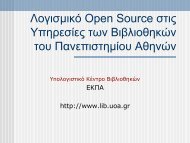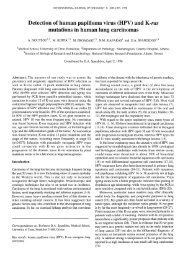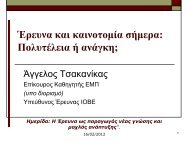Roman onomastics in the Greek East: social and political aspects ...
Roman onomastics in the Greek East: social and political aspects ...
Roman onomastics in the Greek East: social and political aspects ...
You also want an ePaper? Increase the reach of your titles
YUMPU automatically turns print PDFs into web optimized ePapers that Google loves.
At <strong>the</strong> end of <strong>the</strong> 1st century AD, Rome found<br />
herself at <strong>the</strong> head of an empire that covered all of<br />
<strong>the</strong> Mediterranean world. While <strong>in</strong> <strong>the</strong> West <strong>the</strong><br />
prevail<strong>in</strong>g language, or at least <strong>the</strong> rul<strong>in</strong>g language<br />
was Lat<strong>in</strong>, <strong>in</strong> <strong>the</strong> <strong>East</strong> it was <strong>Greek</strong> that rema<strong>in</strong>ed<br />
<strong>the</strong> ma<strong>in</strong> language of communication <strong>and</strong> culture.<br />
Moreover, <strong>the</strong> hellenophone regions were <strong>the</strong> heirs<br />
of <strong>the</strong> traditions of <strong>the</strong> Classical <strong>and</strong> Hellenistic<br />
cities, as well as those of <strong>the</strong> royal descendants of<br />
<strong>the</strong> ancient empire of Alex<strong>and</strong>er. But <strong>the</strong> conquest<br />
reversed <strong>the</strong> traditional balance among regions or<br />
<strong>in</strong>side <strong>the</strong> cities <strong>the</strong>mselves. It established new<br />
<strong>social</strong>, <strong>political</strong> <strong>and</strong> economic relations. Far from<br />
be<strong>in</strong>g a static world, <strong>the</strong> <strong>Roman</strong>-dom<strong>in</strong>ated <strong>East</strong><br />
was <strong>in</strong> fact a zone that underwent deep mutations.<br />
The epigraphic material dat<strong>in</strong>g to this period is<br />
very important but —<strong>in</strong> many <strong>aspects</strong>— underexploited.<br />
The <strong>Greek</strong> pen<strong>in</strong>sula <strong>in</strong> particular, on<br />
a <strong>political</strong> <strong>and</strong> economic marg<strong>in</strong> of <strong>the</strong> <strong>Roman</strong><br />
world, has rema<strong>in</strong>ed <strong>in</strong> <strong>the</strong> marg<strong>in</strong> of research for<br />
along time. Fortunately, this situation has known<br />
a change <strong>in</strong> <strong>the</strong> last few years. Articles <strong>and</strong> books<br />
concerned with <strong>the</strong> various <strong>aspects</strong> of romanitas<br />
have multiplied. Onomastics is naturally an aspect<br />
of greco-roman society <strong>and</strong> a means by which we<br />
can underst<strong>and</strong> it. This colloquium allowed <strong>the</strong><br />
participat<strong>in</strong>g scholars to give account of recent<br />
work <strong>and</strong> to def<strong>in</strong>e <strong>the</strong> perspective of future studies.<br />
The colloquium was <strong>the</strong> result of comb<strong>in</strong>ed work<br />
of <strong>the</strong> Institute for <strong>Greek</strong> <strong>and</strong> <strong>Roman</strong> Antiquity<br />
(KERA) <strong>and</strong> <strong>the</strong> F<strong>in</strong>nish Institute of A<strong>the</strong>ns 1 <strong>and</strong><br />
I take this occasion to express my respect to <strong>the</strong><br />
former directors of <strong>the</strong>se two <strong>in</strong>stitutions,<br />
Professors M. Sakellariou <strong>and</strong> J. Frozen, who did<br />
everyth<strong>in</strong>g possible for its success, as well as to<br />
<strong>the</strong> directors of <strong>the</strong> Swedish Institute <strong>and</strong> <strong>the</strong> French<br />
School of A<strong>the</strong>ns for <strong>the</strong>ir assistance. But we also<br />
owe <strong>the</strong> success of this scholarly ga<strong>the</strong>r<strong>in</strong>g to <strong>the</strong><br />
efficiency <strong>and</strong> dedication of M. Leiwo, <strong>the</strong> <strong>the</strong>n<br />
secretary of <strong>the</strong> F<strong>in</strong>nish School of A<strong>the</strong>ns, <strong>and</strong> to<br />
my colleagues <strong>in</strong> KERA, S. Zoumbaki, L. Mendoni<br />
<strong>and</strong> M. Kantirea.<br />
The proceed<strong>in</strong>gs present 23 communications<br />
that are concerned with various <strong>aspects</strong> of <strong>Roman</strong><br />
<strong>onomastics</strong>. S<strong>in</strong>ce <strong>the</strong> studies are all based on solid<br />
INTRODUCTION<br />
epigraphical documentation —at times new—, so<br />
<strong>the</strong> authors work from a direct knowledge of <strong>the</strong><br />
evidence. This new documentation will be welcomed<br />
by specialists of <strong>the</strong> <strong>Roman</strong> world <strong>in</strong> <strong>the</strong>ir<br />
studies of <strong>the</strong> <strong>East</strong>ern world <strong>and</strong> its particuliarities.<br />
This first meet<strong>in</strong>g will be repeated <strong>in</strong> a few years,<br />
when each scholar will have progressed <strong>in</strong> <strong>the</strong>ir<br />
work, <strong>and</strong> <strong>the</strong> follow<strong>in</strong>g reunions will be more<br />
directly orientated to a particular <strong>the</strong>me.<br />
In a collective work, written <strong>in</strong> five different<br />
languages, it is not possible to follow completely<br />
<strong>the</strong> reference modes <strong>and</strong> <strong>the</strong> typographic practices<br />
<strong>in</strong> every national tradition. I have tried to <strong>in</strong>troduce<br />
a certa<strong>in</strong> uniformity <strong>in</strong> <strong>the</strong> citations of ancient <strong>and</strong><br />
modern works, <strong>in</strong> order to facilitate <strong>the</strong> readers'<br />
work. The <strong>in</strong>dex of nom<strong>in</strong>a has been compiled by<br />
S. Zoumbaki, under my guidance. This book has<br />
been published with <strong>the</strong> help of <strong>the</strong> Liliane Boudouris<br />
Foundation <strong>and</strong> I would like to express here<br />
my thanks to my friend M. Hatzopoulos for<br />
<strong>in</strong>clud<strong>in</strong>g it <strong>in</strong> ΜΕΛΕΤΗΜΑΤΑ.<br />
In conclusion, I have <strong>the</strong> pleasant task of express<strong>in</strong>g<br />
my gratitude both to <strong>the</strong> participants of<br />
<strong>the</strong> colloquium <strong>and</strong> to those who, although unable<br />
to attend, will<strong>in</strong>gly sent <strong>the</strong>ir contributions. I would<br />
like to thank all those who made <strong>the</strong> publication<br />
of <strong>the</strong>se proceed<strong>in</strong>gs possible: M. Leiwo who helped<br />
read <strong>the</strong> first proofs, M. Kantirea <strong>and</strong> Y. Rizakis<br />
who aided <strong>in</strong> various phases <strong>and</strong> <strong>in</strong> particular S.<br />
Zoumbaki whose assistance is greatly appreciated.<br />
F<strong>in</strong>ally I would like to thank H. Sol<strong>in</strong> <strong>and</strong> our friends<br />
of <strong>the</strong> Institutum Classicum of Hels<strong>in</strong>ki, for <strong>the</strong>ir<br />
help <strong>and</strong> collaboration on <strong>the</strong> research of <strong>Roman</strong><br />
anthroponymics, afield<strong>in</strong> which <strong>the</strong> F<strong>in</strong>nish School<br />
opened <strong>the</strong> way to modern scholarship on more<br />
than a few occasions.<br />
A.R.<br />
1 .The programme of research on <strong>the</strong> <strong>Roman</strong> <strong>onomastics</strong><br />
of <strong>the</strong> <strong>East</strong> has been runn<strong>in</strong>g for some years with<strong>in</strong> <strong>the</strong><br />
framework of a bilateral franco-hellenic agreement (<strong>the</strong><br />
"Platon" programme). This agreement was <strong>the</strong> work of <strong>the</strong><br />
teams of KERA of A<strong>the</strong>ns, directed by A. Rizakis, of <strong>the</strong><br />
Pierre Paris Centre of Michel de Montaigne (Bordeaux<br />
III), directed by Ala<strong>in</strong> Bresson, <strong>and</strong> of <strong>the</strong> Année<br />
Épigraphique, directed by M. Corbier <strong>and</strong> S. Follet.<br />
<strong>in</strong>


